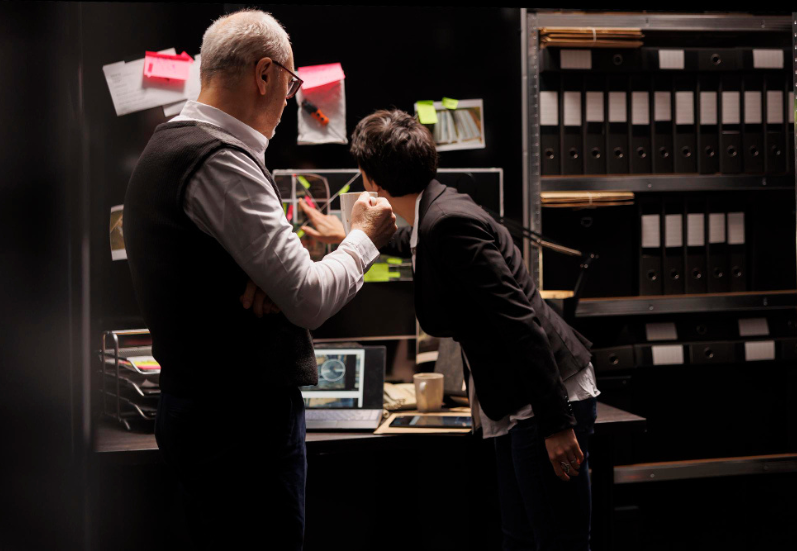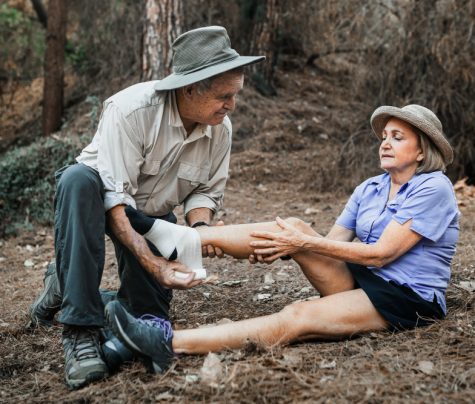
Working from another country requires officially authenticated documents.
Among the most important of these documents is the FBI background check. When used outside the United States, this federal background check must be authenticated through an FBI apostille. It’s a special certification that verifies the document’s legitimacy for international use.
Why has the FBI background check apostille become essential for remote professionals? In what situations will you need it? And how does the FBI background check apostille process work? Read further to find out!
Why Remote Workers Abroad Need An FBI Apostille
An FBI background check is a must if you’re considering working or studying abroad because many countries won’t process visas, residency applications, or certain job placements without it. It wasn’t always like this, so what has changed?
Changing Global Requirements For Remote Employment
It’s clear that countries want to ensure incoming residents pose no public-safety risks, meet ethical and legal standards, and comply with national regulations. An authenticated federal background check is often required for:
- digital nomad visas
- long-term employment contracts
- residence permits
- self-employment or freelance registration
- teaching English or working with minors
- healthcare-related work
- volunteer programs
As remote work continues to expand across borders, understanding the requirements early and preparing the necessary documentation can make your move smoother, faster, and far less stressful.
Difference Between A Regular And Apostilled FBI Background Check
A regular FBI background check is a valid U.S. federal document, but it is not automatically accepted abroad. Foreign governments need confirmation that the document is legitimate and truly comes from the correct U.S. authority.
An apostille is a formal certification recognized by member countries of the 1961 Hague Convention.
When an apostille is added to an FBI background check, it serves as official proof that the document is real, the signature and seal are valid, and the U.S. government formally recognizes the agency that issued it.
Without an apostille, the document typically cannot be used for immigration or legal purposes in other countries.
If you plan to work in countries such as the UAE, Qatar, Kuwait, or Egypt, which aren’t part of the Hague Convention, the document must undergo a different process. It’s known as embassy or consular legalization, which needs additional steps and approvals.
When And Where An FBI Apostille Is Required?
An authenticated FBI background check is required in many situations overseas, and for remote workers, it’s often something employers or immigration offices ask for even before a contract is finalized. That’s why let’s look at some common scenarios that require an FBI background check apostille:
1. Digital Nomad Visas
Countries like Portugal, Spain, Croatia, and Greece, for example, require authenticated background checks for long-stay remote work visas.
2. Residency Permits
If you are going to telecommute from Mexico, Panama, Costa Rica, or Germany, you have to provide a recent, apostilled federal background check before issuing temporary or permanent residency.
3. Work Authorization Or Relocation
Countries like South Korea, Taiwan, and many across Europe require apostilled background checks for anyone working in education, corporate roles, or other regulated fields.
4. Freelancer Or Self-Employment Registration
When applying for a local tax ID or business license in another country, authorities may ask for a criminal background report that’s been authenticated with an apostille.
5. Marriage, Adoption, Or Academic Enrollment Abroad
These personal and legal processes often require a verified and internationally recognized background check.
If the country is not a member of the Hague Convention, applicants must complete the legalization process instead of an apostille. This process requires several steps, both at the U.S. Department of State and at the embassy of the destination country.
Step-By-Step Process To Obtain An FBI Apostille
The idea of apostilling an FBI background check can feel daunting, but the process becomes simple when you know what to do. Here’s a clear breakdown of how to request your FBI report, have it apostilled, and receive the finalized document for international use.
1. Requesting The FBI Background Check
The first step is obtaining your FBI Identity History Summary. You can get the report in two ways:
- Direct submission to the FBI (CJIS Division): You must mail fingerprint cards, the application, and payment to the FBI. Processing time is typically 2–4 weeks. After this time, you get a mailed or downloadable report.
- Through an FBI-approved channeler: These private companies are authorized to send your fingerprints electronically. Here, the processing time is shorter — usually 24–72 hours. Afterwards, you receive a downloadable PDF.
In either case, your fingerprints need to be captured on the standard FD-258 card or through Live Scan. Since smudged or unclear prints are the most common cause of delays, it’s a good idea to have them taken by a trained technician.
2. Submitting The Background Check For Apostille
Once you have the FBI report, the documentation must be authenticated. So, who issues the apostille in this case?
Only the U.S. Department of State in Washington, D.C. can issue an apostille for an FBI background check. Since it’s a federal document, no state-level authority can handle it.
When you send in your document, you’ll need to provide the FBI report (either the original or the PDF), a completed DS-4194 form, the required fees, and clear instructions for how the apostilled document should be returned to you. If you use a service provider, they will print your PDF report, attach the apostille, and manage all document handling on your behalf.
3. Processing Time And Delivery Options
How long an apostille takes largely depends on the service level you select. For FBI background checks, the turnaround time can differ a lot based on whether you submit it yourself or go through a professional service.
If you opt for a professional service, standard processing usually takes about one to two weeks. Rush service often reduces the wait to just a few business days, and some specialized agencies can even provide same-day apostilles.
For countries outside the Hague Convention that require legalization, the process can take 8–10 weeks since several offices need to review and approve the documents.
Just remember, the FBI doesn’t offer any rushed background check service. If you need your results fast, the quickest option is to go through an FBI-approved channeler so you can get the report sooner and then move on to the apostille step.
4. Receiving The Apostilled Document
Now, the apostille is ready, and you will receive the completed documents, usually via any of the following services.
- UPS
- FedEx
- DHL
These services come with full tracking. So you can follow your package every step of the way. You’ll receive both the FBI report and the attached apostille certificate, making the documents valid for use abroad.
Common Challenges And How To Avoid Delays
It’s time to look at the most common problems while getting your FBI check apostilled and ways to prevent them.
1. Smudged Or Rejected Fingerprints
If fingerprints are unclear, the FBI will reject the request. To avoid this, you should always use a Live Scan technician, a police station with trained staff, and a professional fingerprinting agency.
2. Not Allowing Enough Time
Many countries require that background checks be issued within the last 90 days, and processing can take weeks.
So, start early and avoid the bureaucratic lags.
3. Confusing Apostille Vs. Legalization
Are you choosing the wrong type of authentication? If you are from a non-Hague country, you will have to send your document to the embassy for consular legalization. However, if your country is part of the Hague Convention, an apostille will be required.
4. Errors On Forms Or Missing Signatures
Incorrect DS-4194 forms, missed fields, or incomplete fingerprint cards often cause processing stalls. We recommend double-checking everything before submission.
5. International Mailing Delays
Shipping to and from the United States can add additional processing time. If you use trackable courier services, it minimizes risk and ensures quicker delivery.
Benefits Of Apostilled FBI Background Checks For Remote Professionals
Having covered all the pitfalls of the FBI check apostille, we should also mention its benefits for remote workers, and there are a few of them.
1. Simplified Visa And Residency Applications
If you want to work online abroad, properly authenticated documents eliminate confusion and dramatically reduce the risk of application rejection. A correctly apostilled federal background check is often the cornerstone of long-stay visa packages. For Hague-member countries, the apostille provides fast, standardized approval.
2. Proof Of Credibility And Professional Integrity
You are looking for an international remote job. You have to meet the ethical and legal standards as expected by your employer. Now, what does an apostilled background check demonstrate?
- Transparency
- Reliability
- Adherence to Foreign Regulations
It is important for all professionals, especially for people seeking a job in the following sectors.
- Educators
- Healthcare Providers
- IT and Cybersecurity Professionals
- Corporate Consultants
- Nonprofit
- Volunteer Workers
3. Easier Global Mobility And Contract Renewals
Remote professionals who often travel or work across countries, for instance, digital nomads, consultants, and seasonal workers, gain a major advantage by keeping a valid apostilled FBI background check on hand. It helps speed up contract renewals, relocation approvals, visa extensions, and transitions between international jobs.
Using reputable services also streamlines the entire FBI background check apostille process, keeping you compliant and on the move without extra red tape.
The FBI Apostille Is Your Key To A Smooth International Move
An American seeking any of the following will require an FBI Apostille.
- Long-term Stay Visas
- Remote Employment
- Residency Abroad
However, even if you make the smallest error, your visa approval will get delayed or denied.
First things first! Check whether your destination country accepts full legalization or an apostille. Then, submit the documents and follow the right method for the background check.
You can further simplify the process by using trusted apostille and fingerprinting services.











0 Reply
No comments yet.